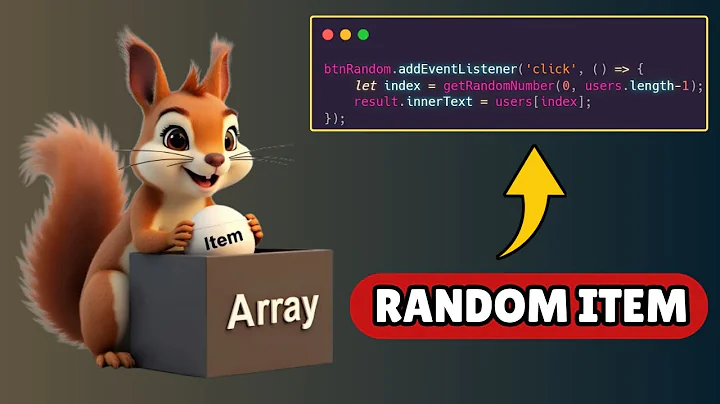How to get a number of random elements from an array?
138,482
Solution 1
Try this non-destructive (and fast) function:
function getRandom(arr, n) {
var result = new Array(n),
len = arr.length,
taken = new Array(len);
if (n > len)
throw new RangeError("getRandom: more elements taken than available");
while (n--) {
var x = Math.floor(Math.random() * len);
result[n] = arr[x in taken ? taken[x] : x];
taken[x] = --len in taken ? taken[len] : len;
}
return result;
}
Solution 2
Just two lines :
// Shuffle array
const shuffled = array.sort(() => 0.5 - Math.random());
// Get sub-array of first n elements after shuffled
let selected = shuffled.slice(0, n);
DEMO:
Solution 3
There is a one-liner unique solution here
array.sort(() => Math.random() - Math.random()).slice(0, n)
Solution 4
lodash _.sample and _.sampleSize.
Gets one or n random elements at unique keys from collection up to the size of collection.
_.sample([1, 2, 3, 4]);
// => 2
_.sampleSize([1, 2, 3], 2);
// => [3, 1]
_.sampleSize([1, 2, 3], 3);
// => [2, 3, 1]
Solution 5
Getting 5 random items without changing the original array:
const n = 5;
const sample = items
.map(x => ({ x, r: Math.random() }))
.sort((a, b) => a.r - b.r)
.map(a => a.x)
.slice(0, n);
(Don't use this for big lists)
Related videos on Youtube
Author by
Shyam Dixit
Updated on July 08, 2022Comments
-
Shyam Dixit almost 2 years
I am working on 'how to access elements randomly from an array in javascript'. I found many links regarding this. Like: Get random item from JavaScript array
var item = items[Math.floor(Math.random()*items.length)];But in this, we can choose only one item from the array. If we want more than one elements then how can we achieve this? How can we get more than one element from an array?
-
Bergi over 10 yearsJust execute it multiple times?
-
Shyam Dixit over 10 yearsFrom this statement can we do this?? Loop generating duplicates.
-
Sébastien over 10 yearsFrom that exact statement you can't get more than one element.
-
Bergi over 10 yearsAh, you should've said that you want no duplicates. Then check Unique random numbers in O(1)? and my answer at Generate unique number within range (0 - X), keeping a history to prevent duplicates
-
 georg over 10 yearsshuffle the array and get the first N, see stackoverflow.com/q/2450954/989121
georg over 10 yearsshuffle the array and get the first N, see stackoverflow.com/q/2450954/989121 -
Tibos over 10 yearsI made a JsPerf to test some of the solutions here. @Bergi's seems to be the best in general, while mine works better if you need many elements from the array. jsperf.com/k-random-elements-from-array
-
-
Shyam Dixit over 10 yearsIn statement items.splice(idx,1) why you use this '1'? splice??
-
Tibos over 10 yearsThat depends on the percentage of random items required from the array. If you want 9 random elements from a 10 element array, it will surely be faster to shuffle than to extract 9 random elements one after the other. If the percentage this is useful for is less than 50%, then there are use cases where this solution is the fastest. Otherwise i concede that it is useless :).
-
Bergi over 10 yearsI meant that shuffling 9 elements is faster than shuffling 10 elements. Btw I'm confident that the OP does not want to destroy his input array…
-
Tibos over 10 yearsI don't think i understand how shuffling 9 elements helps in this problem. I am aware that if you want more than half the array you can simply slice-out random elements until you remain with how many you want then shuffle to get a random order. Is there anything i missed? PS: Fixed array destruction, thanks.
-
Bergi over 10 yearsIt doesn't have to do anything with "half of". You just need to do as much work as elements you want to get back, you don't need to treat the whole array at any point. Your current code has a complexity of
O(n+k)(n elements in the array, you want k of them) whileO(k)would be possible (and optimal). -
Tibos over 10 yearsThis is turning into a lengthy discussion :). I think you are mistaken about the complexities. My code has a complexity of O(n). Splicing code (ex:Rory's McCrossan's answer) has a complexity of O(k), but that is not taking into account splicing which can be very expensive (a naive implementation of splicing would get a O(n) complexity for it. I made a JsPerf to test it for a situation i expect shuffling to be better, available here: jsperf.com/k-random-elements-from-array. Feel free to edit it with a better example!
-
Bergi over 10 yearsOK, your code has more like
O(2n)which could be reduced toO(n+k)if you'd change the loop towhile (counter-- > len-k)and take the last (instead of first)kelements out of it. Indeedsplice(i, 1)doesn't haveO(1), but aO(k)solution is still possible (see my answer). Space complexity however stays atO(n+k)unfortunately, but could becomeO(2k)depending on the sparse array implementation. -
 Prajeeth Emanuel about 7 yearsHey man, I just wanted to say I spent about ten minutes appreciating the beauty of this algorithm.
Prajeeth Emanuel about 7 yearsHey man, I just wanted to say I spent about ten minutes appreciating the beauty of this algorithm. -
 unitario about 7 yearsVery nice! One liner also of course possible:
unitario about 7 yearsVery nice! One liner also of course possible:let random = array.sort(() => .5 - Math.random()).slice(0,n) -
 asetniop almost 7 yearsThere's something strange going on with the randomization in this one - I had the same result show up 6 out of 9 tries (with an n of 8 and an array size of 148). You might think about switching to a Fisher-Yates method; it's what I did and now works much better.
asetniop almost 7 yearsThere's something strange going on with the randomization in this one - I had the same result show up 6 out of 9 tries (with an n of 8 and an array size of 148). You might think about switching to a Fisher-Yates method; it's what I did and now works much better. -
 Ry- almost 7 yearsThis takes quadratic time because it does a bad uniqueness check and doesn’t have an equal chance of selecting every item because it sorts with a random comparison.
Ry- almost 7 yearsThis takes quadratic time because it does a bad uniqueness check and doesn’t have an equal chance of selecting every item because it sorts with a random comparison. -
Bergi almost 7 years@Derek朕會功夫 Ah, clever, that works much better for small samples from large ranges indeed. Especially with using an ES6
Set(which wasn't available in '13 :-/) -
Vlad over 6 yearsGenius! Elegant, short and simple, fast, using built-in functionality.
-
Kurt Peek over 6 yearsShyam Dixit, according to the MDN documentation the
1is thedeleteCountindicating the number of old array elements to remove. (Incidentally, I reduced the last two lines tonewItems.push(items.splice(idx, 1)[0])). -
Bergi about 6 years@AlexWhite Thanks for the feedback, I can't believe this bug evaded everyone for years. Fixed. You should have posted a comment though, not suggested an edit.
-
 pomber about 6 yearsIt's nice, but is far from random. The first item has many more chances to get picked than the last one. See here why: stackoverflow.com/a/18650169/1325646
pomber about 6 yearsIt's nice, but is far from random. The first item has many more chances to get picked than the last one. See here why: stackoverflow.com/a/18650169/1325646 -
Joel over 5 yearsWelcome to SO! When posting answers, it is important to mention how your code works and/or how it solves OP's problem :)
-
almathie over 5 yearsThis does not preserve the sort of the original array
-
 evilReiko about 5 yearsGood answer! Have a look at my answer, copied your code and added "only unique elements" functionality.
evilReiko about 5 yearsGood answer! Have a look at my answer, copied your code and added "only unique elements" functionality. -
Yair Levy about 5 yearsAmazing! if you want to keep the array intact you can just alter the first line like this: const shuffled = [...array].sort(() => 0.5 - Math.random());
-
Sampo almost 5 yearsThis function can return the same element of
sourceArraymultiple times. -
cbdeveloper over 4 years@Bergi this is mind bending. Can I be sure that it won't select the same item more than one time? Thanks!
-
Bergi over 4 years@cbdev420 Yes, it's just a (partial) fisher-yates shuffle
-
 Qasim over 4 yearsCould we have a better explanation of how this works?
Qasim over 4 yearsCould we have a better explanation of how this works? -
robross0606 about 4 yearsI'm trying to wrap my head around how this implementation would not yield duplicates. The comments seem to indicate that it would and then it wouldn't. But, looking at the code, I don't see how it would prevent duplicates. What am I missing?
-
Bergi about 4 years@robross0606 I'm confused by those old comments as well, I've flagged them to be removed. This answer definitely does not produce duplicates (or, only if the input
arrdid contain some), by keeping track of the indices that already were taken. "Editing the question now would invalidate the answers" refers to other answers, like the one by Laurynas. -
user about 4 yearsI've posted an optimized version of this code below. Also corrected the wrong random parameter in the second algo in your post. I wonder how many people are using the previous biased version in production, hope nothing critical.
-
philk almost 4 yearswhile it works it might also be slow for bigger arrays.
-
philk almost 4 years@Bergi I wonder how a predicate could be worked into that? So that one could say "I don't want to have a particular item to be included in the result array`. And also protect against an infinite loop over len when all selected elements being rejected by the predicate.
-
Bergi almost 4 years@philk Just don't include that particular item in the array that you pass?
getRandom(items.filter(…), …) -
JasonWoof over 3 yearsThis does not get you an even distribution. See robweir.com/blog/2010/02/microsoft-random-browser-ballot.html
-
disfated over 3 yearsThere's an error in
log(k*3, 4)since JS doesn't have thebaseargument. Should belog(k*3)/log(4) -
disfated over 3 yearsAlso, I see a downside in the part where you reuse
poolas aresult. Since you truncatepoolit cannot be used as a source for sampling any longer and next time you usesampleyou will have to recreatepoolfrom some source again. Derek's implementation only shuffles the pool, so it can be perfectly reused for sampling without recreating. And I believe this is the most frequent use case. -
MAMY Sébastien over 3 yearsI realize that the function does not generate all possible random array from a source array. In other world, the result is not as random as it should... any idea of improvement?
-
vanowm over 3 yearswhere is
_shufflefunction? -
vanowm over 3 yearsWhat is
_? It's not a standard Javascript object. -
Valery over 3 yearsYou are not making sure two items don't get repeated.
-
Patrolin over 3 yearsResults in slightly uneven distribution.
-
user over 3 years@disfated, thanks, fixed
login my and Derek's code. As for reusing thepool, just don't enable thedestructiveoption, then thepoolargument is shadowed with a copy. -
idleberg over 3 yearsAlso, when the
size >= ar.length, the result will besize-1 -
 Rubek Joshi over 3 years@vanowm It's lodash which is usually imported with the
Rubek Joshi over 3 years@vanowm It's lodash which is usually imported with the_alias. -
jeffbRTC over 3 yearsNeat and concise!
-
Jochem Schulenklopper about 3 years@Qasim, the algorithm takes an array of
items(line 2) and makes an array of pairs: the original item and a random number (line 3). It then sorts the array of pairs per the random number (line 4). Then it makes a list of simple items again, only using the original item (thus skipping the random number, line 5). Finally, it picks the firstnitems of the (randomly ordered) array of items (line 6). For a better understanding, read the documentation of functions likemapandsort, like in developer.mozilla.org/en-US/docs/Web/JavaScript/Reference/…. -
 DedaDev about 3 yearsthe op wasn't asking for that
DedaDev about 3 yearsthe op wasn't asking for that -
Martijn Scheffer about 3 yearsthe problem with this method is that it will get increasingly slow, and in the end it could get slower than just removing the elements you pick
-
Martijn Scheffer about 3 yearsplease don't use jQuery for this type of code
-
Bergi about 3 years@MartijnScheffer No, it doesn't get slower, it gives you
nelements inO(n)bounded time -
 evilReiko about 3 years@MartijnScheffer the original question was asking for a solution using jQuery
evilReiko about 3 years@MartijnScheffer the original question was asking for a solution using jQuery -
 KeshavDulal almost 3 yearsThe jsPerf link seems broken at the moment.
KeshavDulal almost 3 yearsThe jsPerf link seems broken at the moment. -
 I wrestled a bear once. almost 3 years@KeshavDulal - jsPerf has been offline for a long time. This answer is nearly a decade old.
I wrestled a bear once. almost 3 years@KeshavDulal - jsPerf has been offline for a long time. This answer is nearly a decade old. -
João Pimentel Ferreira over 2 yearsIt's nice but CPU intensive for big arrays; why do you need to sort the whole array if you will pick up only few elements?
-
 Geoffrey Hale over 2 yearsThis is not random!
Geoffrey Hale over 2 yearsThis is not random! -
joe.kovalski about 2 yearsThis is a simple solution for simple cases, but for large arrays, it's not truly random. I suggest using
Fisher-Yates (aka Knuth) Shuffleand then you should cut first N results with theslice.








